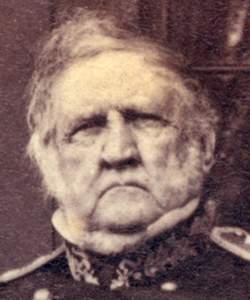Winfield Scott, Election of 1852 (American National Biography)
Scholarship
The Whigs sought a military hero again in 1852, and the party mobilized for Scott's election. However, Scott remained quiet on the slavery question and had been slow in his support of the Compromise of 1850, which worried southern members of the Whig party. He accepted the platform, which included full support of the Compromise of 1850, including the Fugitive Slave Law, which worried many northern members of the party. Scott lost the election, carrying only four states, although the popular vote was not nearly so one-sided.
The successful Democratic candidate, Franklin Pierce, appointed Jefferson Davis as his secretary of war, and Davis and Scott soon quarreled, initially over reimbursements for official travel. Scott and Davis argued over other questions as well, but the underlying cause of their quarrels was longstanding defects in the command system, which led to a division between the line and staff of the army. Whereas the secretary of war controlled the staff, he had not customarily commanded the commanding general, whose duties were undefined by law. Davis sought to remedy that situation, and he had the law and Constitution on his side. Scott maintained that he did not have to follow the orders of the secretary of war except when they were given in the name of the president, but he lost the argument when the attorney general's opinion was that the orders of the secretary of war were always presumed to be issued under the authority of the president.
The successful Democratic candidate, Franklin Pierce, appointed Jefferson Davis as his secretary of war, and Davis and Scott soon quarreled, initially over reimbursements for official travel. Scott and Davis argued over other questions as well, but the underlying cause of their quarrels was longstanding defects in the command system, which led to a division between the line and staff of the army. Whereas the secretary of war controlled the staff, he had not customarily commanded the commanding general, whose duties were undefined by law. Davis sought to remedy that situation, and he had the law and Constitution on his side. Scott maintained that he did not have to follow the orders of the secretary of war except when they were given in the name of the president, but he lost the argument when the attorney general's opinion was that the orders of the secretary of war were always presumed to be issued under the authority of the president.
Richard E. Beringer, "Scott, Winfield," American National Biography Online, February 2000, http://www.anb.org/articles/04/04-00890.html.
Winfield Scott (American National Biography)
Scholarship
Ever ambitious, eager to grasp another honor, and jealous of his rank and fame, Scott was vain and dogmatic. He was always ready to write a letter when he took offense at some fancied insult. According to one of his biographers, he was generous and outgoing and possessed a "constitutional inability to nurse a grudge" (Elliott, p. 648). He was also an extremely effective commander, most notably in the Mexican War. Timothy Dwight Johnson, however, believes that Scott had a deep "streak of meanness and selfishness" and that his "ambition fed his arrogance and, in turn, his arrogance fed his ambition" (Johnson, pp. 4-5). This judgment is probably too harsh, for there is evidence that Scott could be forgiving and merciful. His concern for his soldiers, as in the cholera epidemic of 1832 or his desire for an asylum, went far beyond the normal obligation of a commanding general.
Scott, an Episcopalian, read the Bible often. He was well read and had a library of books on military subjects that was always with him. His reading was a mark of Scott's professionalism, as were his efforts to institutionalize such military skills as tactical training, camp sanitation, organization, and regularized procedure. Scott was responsible for much of the professionalization of the army between the War of 1812 and the Civil War, but his professionalism was limited by his narrow perspectives. His ideas were European in origin and did not fit frontier realities.
Scott, an Episcopalian, read the Bible often. He was well read and had a library of books on military subjects that was always with him. His reading was a mark of Scott's professionalism, as were his efforts to institutionalize such military skills as tactical training, camp sanitation, organization, and regularized procedure. Scott was responsible for much of the professionalization of the army between the War of 1812 and the Civil War, but his professionalism was limited by his narrow perspectives. His ideas were European in origin and did not fit frontier realities.
Richard E. Beringer, "Scott, Winfield," American National Biography Online, February 2000, http://www.anb.org/articles/04/04-00890.html.










